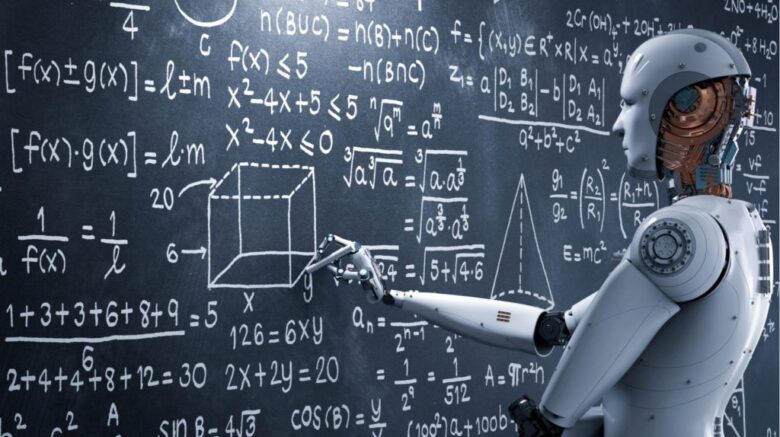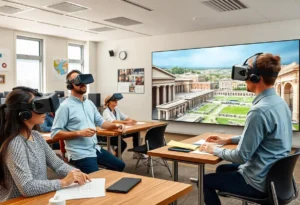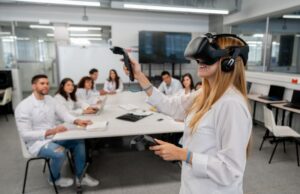Artificial intelligence (AI) is rapidly transforming every aspect of human life, and education is no exception. As technology becomes ubiquitous in classrooms and other learning environments, AI is changing how children learn, how teachers teach, and how schools function. This digital revolution is about more than just using computers or software; it’s about building intelligent systems that can learn, adapt, and enhance the overall learning experience.
Creating a Unique Learning Experience for You
One of the most significant changes AI has brought to education is the ability to personalize learning. Traditional educational institutions often employ a uniform approach that may not be appropriate for all students. AI platforms can analyze students’ strengths, limitations, learning styles, and progress and tailor courses to their needs. This adaptive learning strategy ensures that each student receives a personalized learning experience tailored to their needs. This helps students better understand the content and maintain their interest in the learning process.
Automating Administrative Tasks
AI also simplifies administrative tasks that traditionally took up a significant portion of teachers’ time. AI tools can now process grades, attendance, class schedules, and paperwork. This frees up teachers and administrators to focus on lesson planning, curriculum development, and student interaction. Artificial intelligence can alleviate some of teachers’ workloads and improve the quality of education, allowing schools and universities to function more smoothly.
Improving Student Services
AI also has a significant impact on student services. With AI-powered virtual assistants and chatbots, you can quickly get answers to frequently asked questions about assignments, deadlines, course materials, and school rules. Students can use these tools to seek guidance at any time of the day or night. AI systems can also identify students who may be struggling academically or emotionally and notify teachers or mentors, allowing them to intervene early and provide support, preventing student dropout.
Improving Teacher Effectiveness
AI technology also improves teacher effectiveness by providing data-driven insights. Teachers can use AI analytics to monitor student performance, identify areas for improvement, and adjust their teaching methods. Real-time feedback and predictive analytics empower teachers to make informed choices and help students achieve better results. AI also provides teachers with tools such as intelligent tutoring systems and content recommendation systems, enabling them to deliver engaging, high-quality instruction.
Creating Intelligent Content
AI is revolutionizing the creation and delivery of learning materials. Intelligent content systems can automatically create quizzes, flashcards, summaries, and even complete lesson plans based on textbooks and academic standards. These tools can help teachers save time and ensure the accuracy and consistency of information. AI can also transform traditional content into interactive formats such as films, simulations, and games. This makes learning experiences more engaging for students of all ages.
Breaking Down Language Barriers
AI offers another significant advantage in education: it can help people who speak different languages understand each other. With AI translation and speech recognition, multilingual students can understand and participate in lessons. These systems can instantly translate text, audio, or video, making education more accessible and easier for international students or students who speak multiple languages. This ensures equal access to learning for everyone and makes it easier for people around the world to study together at school.
Easier Distance and Blended Learning
AI is making distance and blended learning models more powerful. Virtual classrooms with AI can provide dynamic, real-time spaces where students can interact, ask questions, and collaborate on group projects. AI can also help students stay focused and self-disciplined in virtual environments by monitoring their engagement and sending notifications or feedback. This is especially important as more and more people are learning online and increasingly need it.
Supporting Lifelong Learning
Artificial intelligence (AI) promotes lifelong learning by making learning materials accessible to people of all ages. AI systems can recommend courses, monitor learning progress, and adapt to the needs of students, whether they want to acquire new skills, change careers, or pursue a hobby. To stay competitive in today’s world, a culture of continuous learning is crucial.
Predicting Learning Outcomes
AI can analyze vast amounts of educational data to predict student performance and future development paths. This information can help schools and universities identify at-risk students, increase retention, and develop programs to help them achieve excellent academic results. Predictive analytics can also help schools improve teaching methods, utilize resources more efficiently, and enhance the overall learning environment. By anticipating problems, AI helps schools proactively address them, leading to better learning outcomes.
Conclusion
AI is transforming the way schools operate, making them more personalized, efficient, accessible to all, and data-driven. AI is revolutionizing the way education is delivered and experienced. It can automate processes, create intelligent content, facilitate remote learning, and increase student engagement. Despite privacy and ethical concerns, AI has the potential to significantly improve education for students of all backgrounds. As we continue to explore the possibilities of AI, the integration of technology and human knowledge will shape how future generations learn.
FAQs
1. What does AI in schools mean?
AI in education refers to the use of AI technologies to improve teaching, learning, and school operations.
2. How does AI personalize learning?
AI analyzes students’ learning styles, progress, and preferences to provide personalized courses and recommendations tailored to their needs.
3. Could AI replace teachers in the future?
The mission of AI is to support teachers, not replace them. By automating tasks and providing them with insights, teachers can teach more easily, but they still need the guidance and emotional support of others.
4. Is the use of AI in schools safe and appropriate?
AI in education is safe if the proper precautions are taken. To use AI ethically, institutions must protect data privacy, mitigate bias, and be transparent about their work.
5. Which AI technologies can educators use?
Examples include personalized learning platforms, virtual tutors, automated assessment software, translation tools, and AI-powered chatbots that support students.




